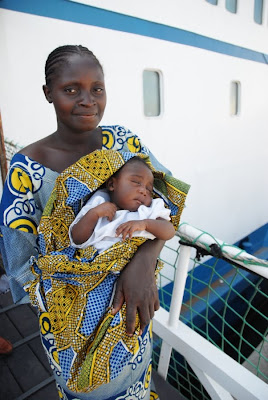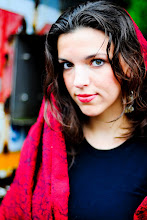



The first time I saw Bysou she stood out. Something about her countenance was special.
I had been walking through the ward, searching for a patient story, when I noticed her sitting in the corner of the room. I walked past her bed towards my friend Ali thinking, "She might be the patient." When I asked Ali if she had any recommendations for a patient story, without hesitation she replied, "You should talk to Bed 13 (Bysou's bed), she is sweet."
That decided it.
I spent the next two weeks getting to know Bysou and her six-year-old son, Donald. They received surgery on the same day and recovered in neighboring beds. Bysou had a facial tumor removed while Donald had a bony lesion taken off his scalp.
The more I learned about Bysou, the more I appreciated her. She is a mother of four children, ages 3 to 13. Her husband died suddenly a year ago of heart failure. Now she is a squatter, staying in her mother's tiny one-room home (she use to own a house), struggling to support her family. After attending college, she worked the business world in accounting and marketing. However, because of her tumor nobody will hire her. Currently, she bakes and sells bread to make ends meet.
Throughout her stay, she kept a pen and paper at her bedside. Every time she had a memorable experience, she wrote it down. When she returns to Nigeria, she wants to write a story about the work of Mercy Ships, hoping to inspire others to support our work.
One afternoon she asked me about the history of Mercy Ships. Someone mentioned Don Stephens book, Ships of Mercy. I promptly went to the ship shop and bought her a copy. In two days, she'd read the entire book.
One of the chapters tells the story of a young girl whose facial tumor was removed by Dr. Gary Parker (who is amazing for many reasons). The evening she'd read that story, Dr. Gary came to the ward to check on his patients. Mildly starstruck, Bysou took him by the hand and thanked him for the amazing work he was doing. I know, because she carefully recounted the story to me the next day.
The most amazing thing about Bysou is her faith in God. After she broke down in tears telling me about the death of her husband and her current state of financial desperation, I asked her if she ever doubted God's love. She casually paused and nonchalantly replied, "No, not really."
Hebrews 11:36-38
"And others had trial of cruel mockings and scourgings, yea, moreover of bonds and imprisonment: They were stoned, they were sawn asunder, were tempted, were slain with the sword: they wandered about in sheepskins and goatskins; being destitute, afflicted, tormented;(Of whom the world was not worthy:)..."
"And others had trial of cruel mockings and scourgings, yea, moreover of bonds and imprisonment: They were stoned, they were sawn asunder, were tempted, were slain with the sword: they wandered about in sheepskins and goatskins; being destitute, afflicted, tormented;(Of whom the world was not worthy:)..."


















































